Rose Lipszyc
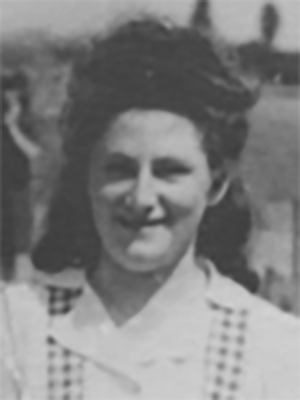
Born: Lublin, Poland, 1929
Wartime experience: Passing/false identity; forced labourer, Germany
Writing Partner: Michelle Fishman
Rose Lipszyc was born in Lublin, Poland, in 1929. At the beginning of the war, she was living with her family in the nearby village of Osmolice.
In 1942, Rose escaped from the forced march that would send her mother and brother to a death camp. She managed to reunite with her aunt and they survived the war under false identities, posing as Polish gentiles while working as forced labourers in Germany. Rose’s mother, father and two brothers were murdered. After liberation, Rose travelled through Austria and Italy before arriving in Israel with her future husband, Jakob, in 1948. They married in 1949 and immigrated to Canada in 1952, where they raised a family and Rose worked as a bookkeeper. Rose is a speaker at the Toronto Holocaust Museum and her story was featured in the 2019 documentary Cheating Hitler: Surviving the Holocaust.
Growing Up in Lublin
I wasn’t a great student; sometimes I was a troublemaker, but I was always very good at math. As a young girl, I used to wear braids, and one time somebody pulled my braids and I reached my hand back to get at them and ended up spilling ink all over the place. The teacher was so mad she made me sit with two big boys in the front row. It was a punishment I’ll never forget.
I must admit that in my younger years I was a bit of a tomboy. My brothers were much quieter children. My older brother used to talk a lot about the stars. He loved astronomy; he was always talking about places that I could never understand. Had he had the chance, he probably would have been an astronomer.
I had a lovely childhood with so many happy memories. I remember all the kids on the street getting together to play hopscotch. The whole street was full; I was always the leader of the running hopscotch. I was the kind of kid who could never sit still, always on the go, such a wild child. My mother would constantly have to go out to try to fix my shoes; I needed new ones all the time because I would always ruin them or wear them out. It was a disaster. I had a lot of friends, friends that were boys too. You know, when a girl is a tomboy, she usually has a lot of followers. There was Shoshanna, my good friend and neighbour; I remember that her father was a Hebrew schoolteacher. Then there was Henia and Pesha who lived next door to us. Neither of them survived the Holocaust.
I have so many random memories from growing up in Lublin. One winter, my mother bought me a pair of skates. She took me to the skating rink on one of the city’s main streets. At night, there was always beautiful lights and music, and it was a really fun place. There was the candy store I used to love to go to at the end of Grodzka Street, before the little Jewish area really started. Whenever I got a grosz, a coin, from my mother I would run there. I used to spend every last grosz I had at that store. I was a very big junk-food eater, not a very good eater, but junk food I loved. I never wanted to eat anything else; my mother was practically paying me money to eat.
I have wonderful memories of walking down the streets of Lublin, seeing the old women sitting next to hot coals, selling little bagels, or the women who made bubaleh, a matzah meal pancake. They were so delicious; I have never eaten a bubaleh like that since then.
We used to spend our summers in a small village called Osmolice in the Polish countryside. It was about twenty kilometres from Lublin. My maternal grandmother was born in Osmolice and had moved to Lublin when she married. Each summer, we rented a little cottage, packed our things into a wagon and made our way to the countryside for a few months. My father had to stay in the city to work so he and my uncles would come to Osmolice for Shabbat. There was a train station in a village not too far away, where we picked them up by wagon.
I learned to swim in a small river near the village. I was a bit of a devil when it came to swimming. I used to secretly sneak down to the river, not wanting my mother to find out. I couldn’t wear my bathing suit because then she would realize what I was doing, so I went into the water in my undergarments. By the end of the season, my mother couldn’t find any of my underwear because when I came back from the river I would squeeze them out and hide them behind something. When she was moving everything around to pack up and go home, she found them all. I remember running away from her so quickly because I knew how mad she would be!
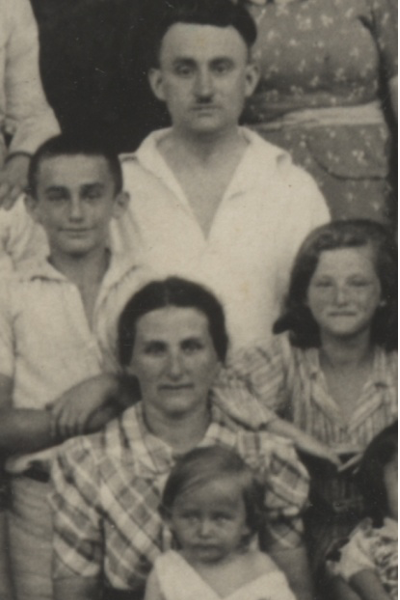
Close-up of Rose with her immediate family — her mother, Deborah, her father, Elizer, and her two brothers, Issy (top) and Heniek (bottom). Lublin, Poland, 1938.
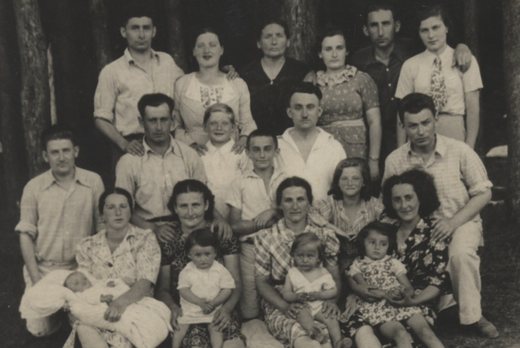
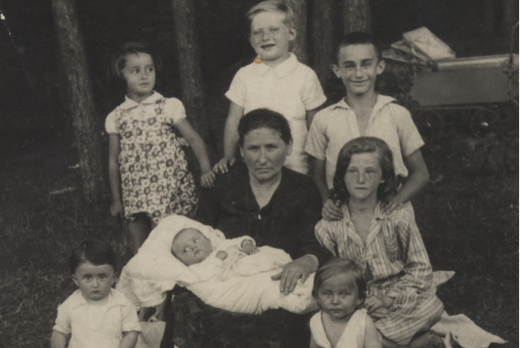
Rose (bottom row, right) with her siblings, grandmother and cousins. Top row (left to right): Hana, Heniek and Rose’s brother Issy. Bottom row (left to right): Fellah, Rose’s grandmother holding a baby cousin, Rose, and, in front, her youngest brother, Heniek. Lublin, 1938.
The Last Summer
The summer of 1942 was the last time my entire family was together. In October, right after the Jewish holidays, an order was given to leave the village of Osmolice and report to a little town nearby. I will never forget the sadness surrounding me. During the holidays, everybody was crying and begging God to save them. Ingrained in my memory is the image of my family praying in that little shack, begging God to help them. Right after the holidays, it became complete chaos and everyone went their separate ways. My mother packed up the few things we had. The night we arrived, we were put into a food store with maybe another five or six families, around fifty people in total. Everybody slept one on top of the other.
Morning came and there was a loud knock at the door. Some soldiers yelled, “Raus!” (Out!) They led us — women, children, everybody — to an empty market. Jews from all the surrounding areas of Lublin were gathered together in this marketplace. The first thing we were told was men and women without children to one side, and women with children to the other side. My father was separated from the rest of us; my mother, two brothers and I stayed together. I never saw my father again. My mother looked me straight in the eye and said, “My dear child, they are taking us to our deaths.” I was thirteen years old. I was petrified.
That day, October 14, happened to be quite beautiful. It usually rained around that time of year in Poland, but it just so happened to be the most gorgeous morning you could have dreamed of. I carried with me a little bag of my own things. I was only allowed to bring along what was most important because nobody could take much. We were directed down a road and we walked, surrounded by guards on both sides. Those who weren’t able to walk anymore, feeble ones, were put on some wagons at the end, and the rest of us were forced to walk along a small highway that led out of the little town to a train station.
Along the way, my mother took whatever she was carrying and threw it away. She made me throw away whatever I had too. Mother told me we would no longer need our belongings and that we should enjoy our last day together. She then said to me, again, “We are being taken to our deaths,” and continued saying, “The only hope that one of us will survive is in you. I don’t believe that the whole world has gone mad; there is going to be somebody out there who is going to help you. And if you survive, I will survive, because a part of me will live on in you. I have to put all my faith in you.” She wanted me to escape. My mother had no choice but to stay — she couldn’t leave with me because of my little brother. If she had been caught with him, the Nazis would have known right away that they were Jewish because he was circumcised. So she wanted me to sneak away by myself.
Mother slowly began to pull us back through all the people walking until we were at the very end of the line, just before the horses and buggies. She then forced me off the road, pushing me away from all the people. Still, to this day, I wonder where she got the strength to push her own child, without a cent to her name or even a change of clothes, out of the line to try to survive on her own. She still believed in the human race. She truly believed that somebody was going to help me.
Like a complete idiot, I just stood there. I was so scared that I didn’t move. The last guard came over to me and asked me if I was Jewish or Polish. I had blue eyes, blond hair and a freckled face. I didn’t particularly look Jewish. It wasn’t difficult to mistake me for a gentile. There were a few houses on both sides of the road and maybe the guard thought that some kids had come out to see what was going on. I’m not sure who, maybe a Polish farmer who was taking people to the train in the wagons, yelled, “Oh, don’t you see she is Polish?” And they just left me there, standing alone on the road.
The next thing I remember is running into the fields, but as good a memory as I have, I don’t recall a single thing about that afternoon. All I know is that I ran through the fields for miles and miles and toward evening I found my way to a Polish farmer’s house. I know it must have been pretty far because it took me an entire afternoon to get there. I remembered this farm and I knew that my family had a relationship with the owners.
I knocked on the door and when the farmer let me in, I couldn’t believe my eyes — my grandmother was standing there! It turned out that because my family knew this farmer, my uncles had told my grandmother to go and stay there to avoid deportation. The farmer’s name was Mr. Jablonski. He was a very decent human being. My mother had dealt with him through the years, selling him some nice linens, and my father used to sew things for him. I can’t explain how it felt to walk in there and see a familiar face. She asked me where I had been and said that the rest of my family was looking for us. They were all wondering what had happened. She wanted to know where my mother was and I told her I didn’t know. All I knew was that Mother was gone.
“We are being taken to our deaths,” my mother said. “The only hope that one of us will survive is in you. I don’t believe that the whole world has gone mad; there is going to be somebody out there who is going to help you. And if you survive, I will survive, because a part of me will live on in you. I have to put all my faith in you.” She wanted me to escape.
My New Life
We were taken to a place where we stood naked in front of German doctors so they could examine our bodies. I was only thirteen and they were not taking workers that young, so it was of vital importance that I appear mature to the German soldiers and doctors. I was very underdeveloped and therefore looked quite young. Even one of the Polish women standing behind me in line commented aloud on how childish I appeared. She said they would never take me. My aunt Rose and I were so scared; the woman was right, I did look like a child. I began to contemplate what I would do if they didn’t take me…. Where would I go? There was no place for me to go other than into the Nazis’ hands, to admit that I was Jewish and that’s it. Lucky for us, this was not the case. In the end, I passed the selection because my height met the requirements. Rose and I spent nearly a week in this place before being shipped off to Germany. The whole time we were so fearful that someone would walk in, recognize us and tell the Germans who we really were.
After about a week, they put us on a train and we travelled for what felt like forever, but in reality it was about eight days, through all of Poland to get to Germany. I don’t remember the name of the place we stopped at, but it was where all of the labourers were put together and divided up into different places for work. It was a horrible place. We needed to be checked again by soldiers and one of them ripped off my aunt’s brassiere. The men there were terrible.
Eventually, all the people were separated into different groups. Rose and I were sent to Bremen-Grohn, a place on the outskirts of Bremen, Germany, a port city near Hamburg. We were assigned to a house of eighty girls, all Polish. All eighty women were stuffed in one tiny house. The living conditions were awful; in the cramped quarters, hunger and lice were rampant.
We were forced to wear a “P” for Pole on our clothing at all times for identification. From this moment, my “new” life began. Everything I once knew had to be forgotten. It was unimaginably difficult to pretend to be something you are not, to tell stories about your life that never really happened. Mastering this deception was an art, learning a new talent in order not to give myself away. Remembering the stories I had made up and constantly repeating them was not an easy task, but I was certainly good at it. We were not as worried about the Germans catching on as we were about some of the Polish women. We really worked hard to disguise ourselves from the people we lived and worked with twenty-four seven. Fooling a Pole was tough. Many had lived in such close quarters to their Jewish neighbours prior to the war and a lot of them recognized a Jew when they saw one.
I had another huge issue when it came to disguising myself during those years — I had quite a head of hair. My hair was very curly and it was well known that most Polish girls had straight hair. In order to avoid any suspicion, I wore my hair in braids every day. I would braid it tight to conceal my curls. Every time it rained and a little curl popped out, I was extremely worried. I would always curse the one that managed to slip out in the middle of my forehead. Some of the Polish girls made jokes about me. They would laugh and say I had curly hair like a Jewish girl. I learned to make fun of it too. So long as I didn’t show any fear and played it off like a joke, they left me alone. Eventually, I became one of them. I would do things like go to church every week. I was a fast learner so it was easy for me to pick up all the songs. My ability to catch on quickly really helped us the first couple years.
In order to really keep our facade going, we had some help from outside sources. My mother’s brother Eli wrote love letters to my aunt Rose while we were in Germany. Pretending to have a boyfriend not only enhanced the lie we were trying to keep up, but it also kept men from bothering my aunt, because they all thought she was taken. She was a very good-looking woman and many men were interested in her. By the end of 1943, the letters from my uncle stopped coming so we knew he had died. Up until that point, he had been in hiding with a Polish woman who was in love with him. We were told later that one day he had gone out to help someone, got caught and was killed.
The Jablonskis also wrote to us, pretending to be our parents. It was such a big help to be receiving letters from Poland; it made everything appear more believable. People would not refute who we were if our “Polish parents” were sending letters. From time to time, they also sent us food parcels. They were truly amazing people. Had it not been for their courageous acts, I may not have survived.
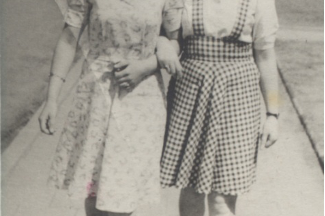
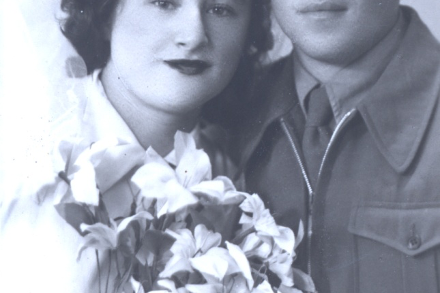
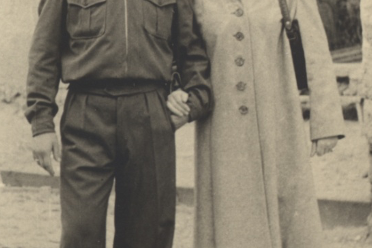
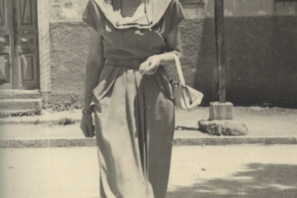
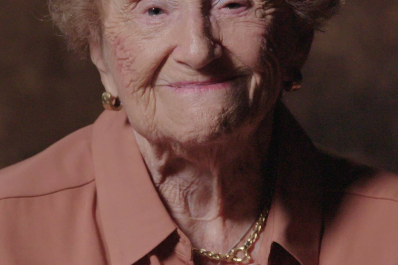
For My Family
After the war, I was afraid of revealing my identity to people. For years, I wouldn’t want to outright admit to someone that I was Jewish. There must have still been something inside, some stupid fears I still had that held me back. I’m ashamed of myself for doing it, but the fear never really leaves you. Even now, I still have nightmares that bring me back to that horrible time. Once, I dreamt that I had my children with me, that we had to run from the Nazis and I couldn’t figure out how to hide them. It was terrifying.
The fact that I still sometimes have these fears makes me question the world today, the world we live in. It’s not always a very nice world, bad things are still happening, but we make the best of it. I just hope I’m leaving my grandchildren a better world to live in. That’s my biggest fear; I’m not afraid for myself anymore, I’m eighty-four years old [now ninety-one], but I am afraid for the future generations. My son has two girls and my youngest, Linda, has three. I have five lovely granddaughters and one great-granddaughter. [As of 2019, Rose has three great-grandchildren.] I want my grandchildren and great-grandkids to grow up in a better world than the one I was brought up in.
I always wonder how many geniuses were killed, children with so much potential who would have given so much to the world. Just look at my own family: I have a daughter who is a lawyer and works for the children’s aid society; I have a daughter who is a professor; and a son who is doing extremely well in life. Who knows how much potential was lost, how many great things the victims of the Holocaust could have accomplished had they been given the opportunity.
Many survivors don’t like to tell their stories and I understand their point of view, but in my opinion, I think that it should be talked about. When a survivor tells their story, they bring all those who perished to life. Otherwise, it can feel like those people didn’t exist. This way, when I talk about the victims, like my family, they come to life through my words. I owe them that much. It is so difficult to talk about; I don’t sleep a wink the night afterwards, but I bring them back to life and that is what makes it worth it for me.
I think my experiences during the Holocaust have of course greatly shaped the person I am today. I share my story with many different groups of people; I am a regular speaker at the Holocaust centre (now the Toronto Holocaust Museum) in Toronto. When I tell the younger generations about what I have been through, I always end on a positive note, sharing with them what I have taken away from all my experiences.
I tell them first and foremost not to hate, that hate only destroys you. Be tolerant of one another. There is good in a lot of people. Hatred is an emotion you are better off without, no matter what. It makes no difference to those you are directing the hate toward, but it will eat you up from the inside. If I let my past consume me, then I would be giving Hitler and the Nazis another victim.
I sometimes tell people you never really know your neighbour or what they are capable of, both positively and negatively speaking. Under different circumstances, you don’t know how a person would choose to behave and honestly you yourself don’t know what you would do. It’s very hard to judge, in different situations, how a person will choose to react. In my case, I had a brave man put his life on the line for me and I am thankful for that every day. But I also recognize that there were those who stood by and did nothing, allowing millions of people to be murdered.
Most importantly, I always end by telling the kids to listen to their mothers. They laugh at that one all the time. But I tell them this is no joke — for me, it’s a fact of life. If I wouldn’t have listened to my mother, I wouldn’t be alive today. You know, it’s really not a cliché. I’m telling you the truth. Throughout the war, I always thought about my mother because I actually believed what she told me. I think, in some way, it’s what saved me; she gave me the strength to go on and live. The way some people look for strength in a higher power, I turned to my mother. She said I would survive and she wouldn’t accept that the entire world had gone mad. She knew somebody, somewhere, would help me and she was right. It boggles my mind to this day, how in the face of death, she still had faith in humankind. It’s the most amazing thing to me.
My mother was a smart woman. She saw all the signs around us and knew where we were headed that day. She somehow realized what was in store for us. So she put all her hope in me. Something told her I could survive in the name of all of us. Now I need to live for so many people — for my mother, my father, my brothers, my grandparents, my aunts, my uncles. I had little cousins; there were so many young kids that I loved so much. They’re all gone. So much potential lost.
Every Holocaust survivor has a unique story and mine is no exception. I spent my war years hiding my Jewish identity, disguising myself, pretending to be someone I was not. I lost members of my family, including all of my immediate family. I tell my story for them and all others whose lives were lost during the Holocaust.

